|
Module Eleven: Abolitionism, Westward Expansion
Welcome to HST 201 Module Eleven! We are looking at the growing tensions between the federal government and Native Americans. Next Rule of History: Remove the term Un-American from your vocabulary. And as a bonus, don’t listen to anyone that uses the term “Un-American” as they surely have an agenda. With the first ten rules in place, you can seem where one would violate multiple rules before they violate number 11. As you scroll through social media, the nonsensical term “Un-American” is applied to any person or idea that doesn’t fit a certain narrative. You must ask yourself, what is American then? Is it a deep respect for the powers that be and the status quo? Is it a violent police state that subdues minorities? Is it a suppression of free speech and oligarchic control of a rigged election? Is its entrepreneurial spirit? A freedom both of mind and of economic choices? Is it seeking out the boundaries of science, technology, and culture in a manifest destiny approach? Is it apple pie? The answer is, as to no one’s shock, maybe? The human experience as well as the American experience is multifaceted and complex. The worldviews of a housewife from the 17th century will most certainly clash with those of a gay black man in the 1980s. And that is okay, there is room for many types of Americans to sit at the table. When a political pundit uses the term “Un-American” they are really saying that “you don’t belong here.” They want to dehumanize and demote any oppositional viewpoint or lifestyle. America means something to me, and it means something to you. It means something to Abraham Lincoln, and something completely different to Iraqi child soldier. We need to sit back and not validate each other’s worldviews, but validate that they exist.
HIGHLIGHTS
READING
My classes utilize both Howard Zinn's Patriot's History of the United States and Larry Schweikart's Patriot's History of the United States, mostly in excerpts posted to the modules. You can access the full text of People's History or Patriot's History by clicking on the links. 
Zinn Chapter 7: As Long As Grass Grows or Water Runs
…As soon as Jackson was elected President, Georgia, Alabama, and Mississippi began to pass laws to extend the states' rule over the Indians in their territory. These laws did away with the tribe as a legal unit, outlawed tribal meetings, took away the chiefs' powers, made the Indians subject to militia duty and state taxes, but denied them the right to vote, to bring suits, or to testify in court. Indian territory was divided up, to be distributed by state lottery. Whites were encouraged to settle on Indian land. However, federal treaties and federal laws gave Congress, not the states, authority over the tribes. The Indian Trade and Intercourse Act, passed by Congress in 1802, said there could be no land cessions except by treaty with a tribe, and said federal law would operate in Indian territory. Jackson ignored this, and supported state action. It was a neat illustration of the uses of the federal system: depending on the situation, blame could be put on the states, or on something even more elusive, the mysterious Law before which all men, sympathetic as they were to the Indian, must bow. As Secretary of War John Eaton explained to the Creeks of Alabama (Alabama itself was an Indian name, meaning "Here we may rest"): "It is not your Great Father who does this; but the laws of the Country, which he and every one of his people is bound to regard." The proper tactic had now been found. The Indians would not be "forced" to go West. But if they chose to stay they would have to abide by state laws, which destroyed their tribal and personal rights and made them subject to endless harassment and invasion by white settlers coveting their land. If they left, however, the federal government would give them financial support and promise them lands beyond the Mississippi. Jackson's instructions to an army major sent to talk to the Choctaws and Cherokees put it this way: Say to my reel Choctaw children, and my Chickasaw children to listen-my white children of Mississippi have extended their law over their country. .. . Where they now are, say to them, their father cannot prevent them from being subject to the laws of the state of Mississippi. . .. The general government will be obliged to sustain the States in the exercise of their right. Say to the chiefs and warriors that I am their friend, that I wish to act as their friend but they must, by removing from the limits of the States of Mississippi and Alabama and by being settled on the lands I offer them, put it in my power to be such-There, beyond the limits of any State, in possession of land of their own, which they shall possess as long as Grass grows or water runs. I am and will protect them and be their friend and father. That phrase "as long as Grass grows or water runs" was to be recalled with bitterness by generations of Indians. (An Indian GI, veteran of Vietnam, testifying publicly in 1970 not only about the horror of the war but about his own maltreatment as an Indian, repeated that phrase and began to weep.) As Jackson took office in 1829, gold was discovered in Cherokee territory in Georgia. Thousands of whites invaded, destroyed Indian property, staked out claims. Jackson ordered federal troops to remove them, but also ordered Indians as well as whites to stop mining. Then he removed the troops, the whites returned, and Jackson said he could not interfere with Georgia's authority. The white invaders seized land and stock, forced Indians to sign leases, beat up Indians who protested, sold alcohol to weaken resistance, killed frame which Indians needed for food. But to put all the blame on white mobs, Rogin says, would be to ignore "the essential roles played by planter interests and government policy decisions." Food shortages, whiskey, and military attacks began a process of tribal disintegration. Violence by Indians upon other Indians increased. Treaties made under pressure and by deception broke up Creek, Choctaw, and Chickasaw tribal lands into individual holdings, making each person a prey to contractors, speculators, and politicians. The Chickasaws sold their land individually at good prices and went west without much suffering. The Creeks and Choctaws remained on their individual plots, but great numbers of them were defrauded by land companies. According to one Georgia bank president, a stockholder in a land company, "Stealing is the order of the day." Indians complained to Washington, and Lewis Cass replied: Our citizens were disposed to buy and the Indians to sell. . .. The subsequent disposition which shall he made of these payments seems to be utterly beyond the reach of the Government.. . . The improvident habits of the Indian cannot be controlled by regulations.... If they waste it, as waste it they too often will, it is deeply to be regretted yet still it is only exercising a right conferred upon them by the treaty. The Creeks, defrauded of their land, short of money and food, refused to go West. Starving Creeks began raiding white farms, while Georgia militia and settlers attacked Indian settlements. Thus began the Second Creek War. One Alabama newspaper sympathetic to the Indians wrote: "The war with the Creeks is all humbug. It is a base and diabolical scheme, devised by interested men, to keep an ignorant race of people from maintaining their just rights, and to deprive them of the small remaining pittance placed under their control." A Creek man more than a hundred years old, named Speckled Snake, reacted to Andrew Jackson's policy of removal: Brothers! I have listened to many talks from our great white father. When he first came over the wide waters, he was but a little man ... very little. His legs were cramped by sitting long in his big boat, and he begged for a little land to light his fire on. ... But when the white man had warmed himself before the Indians' fire and filled himself with their hominy, he became very large. With a step he bestrode the mountains, and his feet covered the plains and the valleys. His hand grasped the eastern and the western sea, and his head rested on the moon. Then he became our Great Father. He loved his red children, and he said, "Get a little further, lest I tread on thee." Brothers! I have listened to a great many talks from our great father. But they always began and ended in this-"Get a little further; you are too near me." Dale Van Every, in his book The Disinherited, sums up what removal meant to the Indian: In the long record of man's inhumanity exile has wrung moans of anguish from many different peoples. Upon no people could it ever have fallen with a more shattering impact than upon the eastern Indians. The Indian was peculiarly susceptible to every sensory attribute of every natural feature of his surroundings. He lived in the open. He knew every marsh, glade, hill top, rock, spring, creek, as only the hunter can know them. He had never fully grasped the principle establishing private ownership of land as any more rational than private ownership of air but he loved the land with a deeper emotion than could any proprietor. He felt himself as much a part of it as the rocks and trees, the animals and birds. His homeland was holy ground, sanctified for him as the resting place of the bones of his ancestors and the natural shrine of his religion. He conceived its waterfalls and ridges, its clouds and mists, its glens and meadows, to be inhabited by the myriad of spirits with whom he held daily communion. It was from this rain-washed land of forests, streams and lakes, to which he was held by the traditions of his forebears and his own spiritual aspirations, that he was to be driven to the arid, treeless plains of the far west, a desolate region then universally known as the Great American Desert. According to Van Every, just before Jackson became President, in the 1820s, after the tumult of the War of 1812 and the Creek War, the southern Indians and the whites had settled down, often very close to one another, and were living in peace in a natural environment which seemed to have enough for all of them. They began to see common problems. Friendships developed. White men were allowed to visit the Indian communities and Indians often were guests in white homes. Frontier figures like Davy Crockett and Sam Houston came out of this setting, and both-unlike Jackson-became lifelong friends of the Indian… 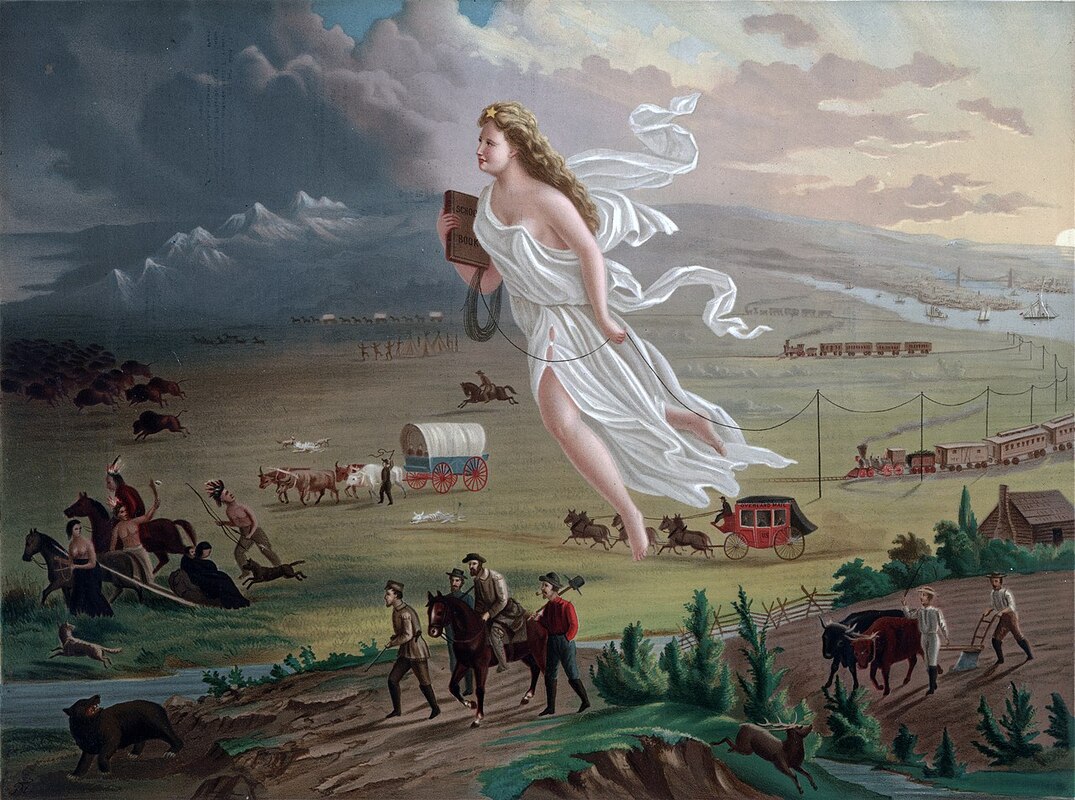
American Progress (1872) by John Gast is an allegorical representation of the modernization of the new west. Columbia, a personification of the United States, is shown leading civilization westward with the American settlers. She is shown bringing light from east to west, stringing telegraph wire, holding a book, and highlighting different stages of economic activity and evolving forms of transportation.
ASSIGNMENTS
Forum Discussion #12
The Mexican–American War was an armed conflict between the United States of America and the United Mexican States (Mexico) from 1846 to 1848. It followed in the wake of the 1845 American annexation of the independent Republic of Texas. Do some research and please answer the following question with a two-paragraph minimum:
Explain how and why Texas seceded from Mexico. Need help? Remember the Discussion Board Rubric.
0 Comments
Leave a Reply. |
AuthorRyan Lancaster wears many hats. Dive into his website to learn about history, sports, and more! Archives
April 2024
Categories |

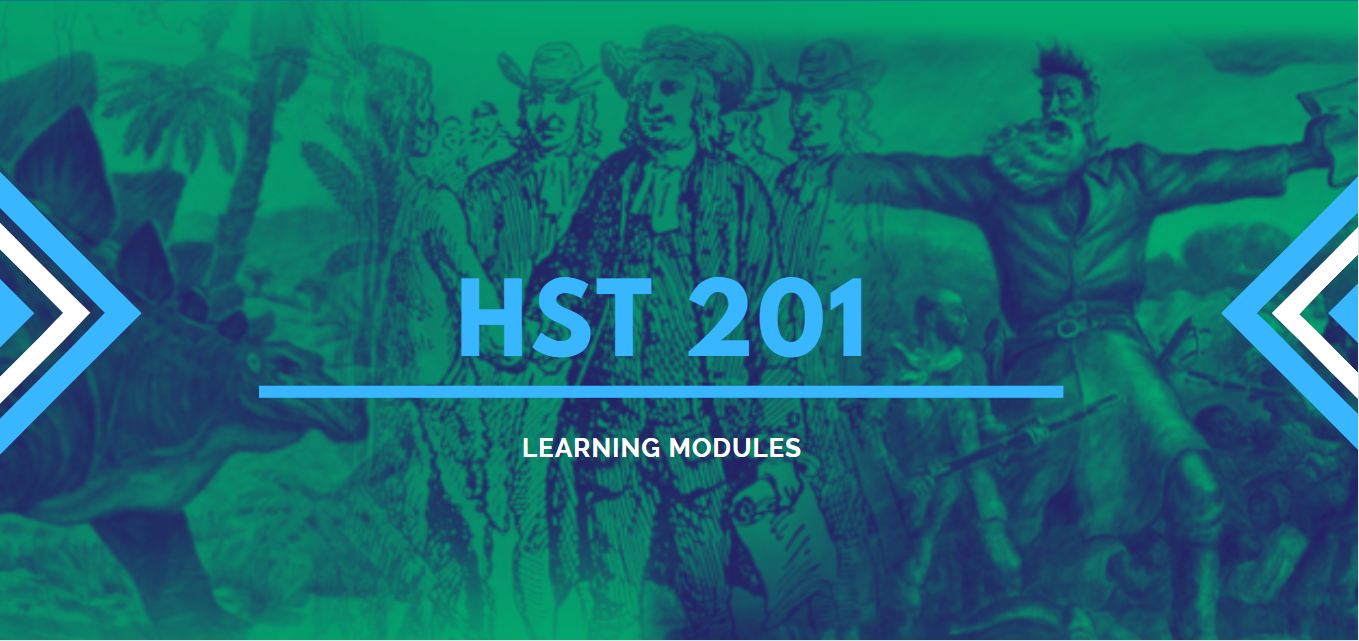
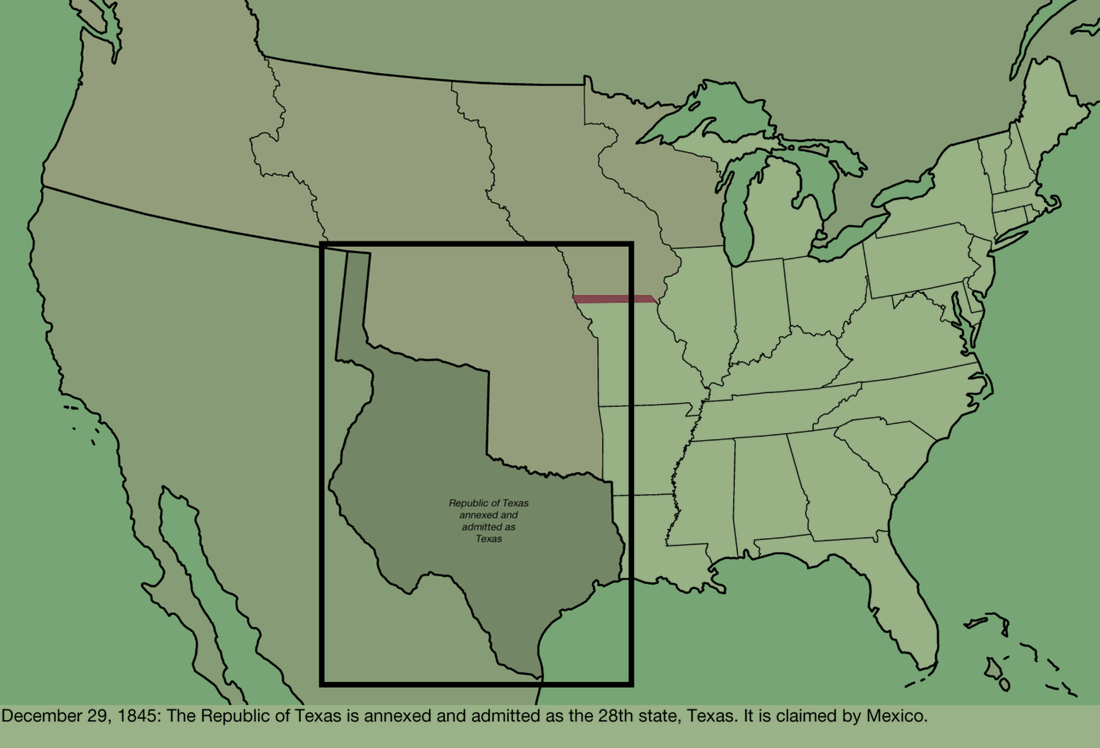
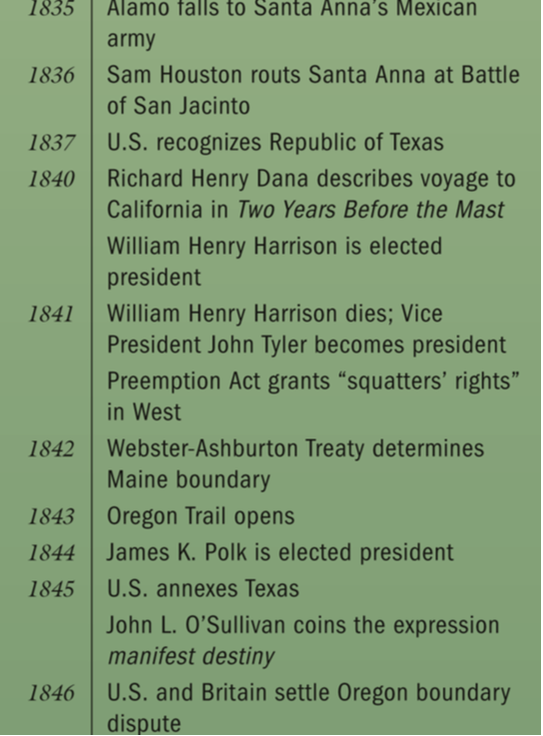
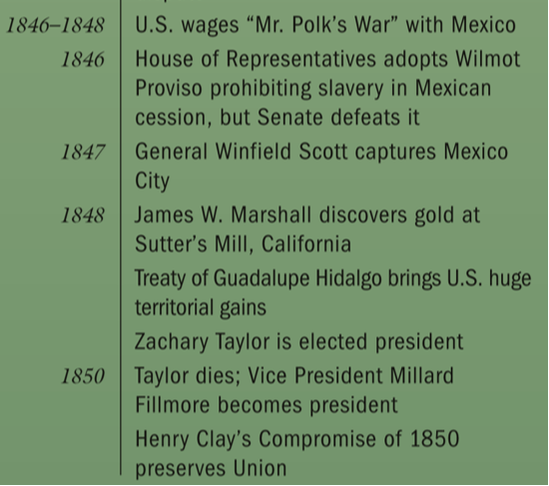
 RSS Feed
RSS Feed